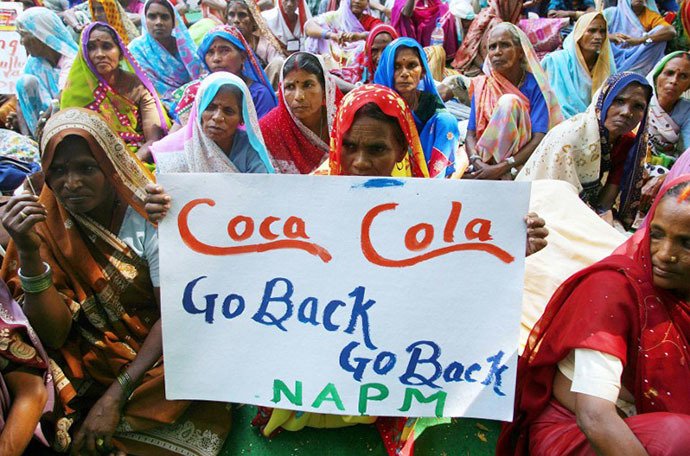
How Coca-Cola Disregarded The Lives Of People And The Environment In India
13 Dec 2016 11:40 AM GMT
Editor : Umaima Saeed Saeed
An Introvert who binges on cricket and let's her writing do the talking
Coca-Cola is one of the most recognisable brands in the world. The company claims to adhere to the “highest ethical standards” and be “an outstanding corporate citizen in every community we serve”. But, its activities in India tell a different story. Stories of how improper institutional practices can put the welfare of the people living in the area at stake.
People have accused Coca-Cola of dehydrating villages in its pursuit of water resources to feed its plants, drying up the local agriculture.
The company admitted that it would not have a business without water. All its operations are highly dependent on the access to vast supplies to water. It takes nearly three litres of water to make one litre of Coca-Cola, as per this report.
Here are the Coca Cola water exploitation stories that emerged from different Indian villages.
Kaladera – Rajasthan
Coca-Cola established a bottling plant in Kaladera in the desert state of Rajasthan at the end of 1999. Kaladera is a small and impoverished village having semi-arid conditions. Local farmers rely on access to groundwater for cultivating crops. Since Coca-Cola’s arrival in town, they have seen a decline in the water levels. They were unable to irrigate their lands and sustain crops, and the families were at a high risk of losing their livelihoods.
Official documents from the government’s water ministry showed that water levels remained stable from 1995 until 2000 when the plant became operational. The water levels then dropped by almost 10 metres in the next five years.
The Energy and Resources Institute (TERI) conducted a study on the influence of the company on the lives of the villagers. In February this year, they recommended that Coca-Cola shut down its plant in the village. They said, “the plant’s operations in this area would continue to be one of the contributors to a worsening water situation and a source of stress to the communities around.” Subsequently, Coca-Cola shut down the plant permanently.

Plachimada – Kerala
In March 2000, Coca-Cola commenced operations at its bottling plant at Plachimada. Over the next few years, the area surrounding the plant began to feel the plant’s dangerous effects. The groundwater in the area was contaminated, and a lot of toxic waste was released. What followed was a struggle by the locals, interest groups, and NGOs, which eventually led the plant closure in March 2004. The village council did not renew the company’s licence, claiming that the plant had over-used and contaminated local water resources. The Kerala High Court later ruled that Coca-Cola’s massive extraction from the common groundwater resource was illegal.
Villagers complained that the water was unsuitable for drinking or cooking; it turned milky white and was brackish. Unusual stomach aches became familiar, while farmers complained of wells emptying and crop yields decreasing.
The bottle washing taking place at the Coca-Cola plant involved chemicals and the resulting sludge released outside the plant. Initially, they sold the sludge as a fertiliser to unsuspecting farmers. As the villagers figured out what it was and the resentment grew, the company dumped it on the roadside. More than 1000 families in the surrounding villages had been affected.

Mehdiganj – Uttar Pradesh
Mehdiganj is a largely agrarian town where locals rely on groundwater to meet most of their needs. After the company had set up their plant there, the local wells dried up. This forced the villagers to walk long distances for fresh water. With the drop in water level, crop yields also dropped, worsening the economic conditions of the village and endangering the livelihoods of thousands of residents.
After eleven years of campaigning by local people suffering from severe water crisis, the UP state authorities finally closed Coca-Cola’s bottling plant in 2013.
Other cases
Their plants were shut down in several other places in the country. Uttarakhand and Tamil Nadu rejected the company’s proposals to build plants in their states in 2014 and 2015 respectively, after protests by local people. We also reported when 18 villages near Varanasi demanded that water supply to Coca-Cola be stopped.
Their second largest plant in the country in Hapur, Uttar Pradesh was shut down. 60km from Delhi, this plant was under scrutiny by the National Green Tribunal since 2015. After finding multiple environmental violations, they were ordered to close down operations in August this year. The full article by India Resource Center (IRC).
More recently, the Madras High Court stopped the Tamirabarani river water supply to Coca-Cola and Pepsi plants in Gangaikondan, Tamil Nadu, as per this IRC report.
Coke also used pesticides like DDT which are banned in India. In 2003, the Centre for Science and Environment released a report with the information. All the data was corroborated in the 2004 Parliamentary session, which led to a ban of Coke products in the cafeteria.
Not just in India, but Coca-cola has been violating environmental and human rights laws across the world. For a multi-billion dollar company, their business methods are quite irresponsible and negligent. You can read more about this here.
 All section
All section













